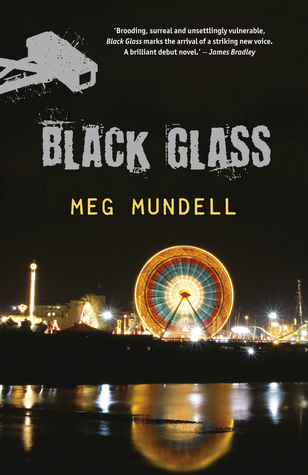Black Glass by Meg Mundell has been on my reading list for a while. When I was looking through my Kindle to find which book to read next, I picked it more because I’ve had it for a long time than because it leapt out at me.
And I loved it.
So why did it take so long for me to pick up the book? I try to avoid reading detailed reviews of books on my to-be-read list (for fear of spoilers) but I do often glance over high level descriptions to get a feel for whether I’m going to like a book. And I realised that I had internalised two main facts about Black Glass through this vague process of osmosis.
- The book was really good (like, award nomination good).
- It was a story of two teenage girls trying to find each other in a dystopian Melbourne.
From this (admittedly very small) evidence base, I had put together an image of a technically very good book, a “worthy” novel, that would make me a better person to read, but that I might not actually enjoy. And those kinds of books tend to stay on my to-be-read pile for a long time.
I shouldn’t have hesitated. The book is technically very good and does have interesting things to say, but it is also hugely entertaining.
So, in the interests of providing an alternative view of the book, let me describe it this way. If you like William Gibson (especially the Blue Ant series) and love speculative fiction set in an Australian context, you’re going to like Black Glass.
The structure of the novel seemingly chaotic on the surface, with a conventionally constructed main narrative thread told from the point of view of the two separated sisters (Tally and Grace) interwoven with minor threads told from the point of view of Milk (a man pioneering the art of influencing the mood of a group of people through light, sound and smell) and Damon (a freelance journalist in a world where you’re only as good as your last story). To top it off, small vignettes from a variety of minor or one-off characters, performed in unusual modes (e.g. one sided conversations, surveillance tapes, news snippets etc) illustrate aspects of this future dystopia. It comes together in a chaotic blend, exactly the kind of smart writing that rewards a small investment in adjusting to an unusual narrative style.
Mundell covers some big themes, including the unhealthy manipulation of the citizenry by the media, the dumbing down of journalism, increasing stratification of society into haves and have-nots, government control, familial relationships and survival on the streets when you have no resources to draw on. In some of the scenes that depicted the freelance journalist pitching stories to editors, I detected the scent of personal experience in the journalist’s frustration with people who want “grit” but not “substance” – I wouldn’t be surprised to learn that Mundell herself has some experience in the journalism space.
The main characters are all richly drawn, with distinctive voices (both in terms of dialog and general tone). Mundell invests a lot of energy in creating characters that are both mostly sympathetic (despite their flaws) and compelling. This depth pervades even the more minor character, some of the tragedy that surrounds the character of Blue, for instance, has a strong impact even though the worst of it happens off stage.
The style is reminiscent of Gibson’s work, obviously set in the future, but not the unrecognisable future. Interesting asides on technology, and the different styles of narrative, complete the affect.
This is a strongly character driven piece, sometimes at the expense of the plot. This does result in the pace sometimes dragging a little but this is a minor quibble.
All in all I found Black Glass a thoroughly engaging read. Highly recommended.
I also reviewed this book on Goodreads. View all my reviews.

This work by Mark Webb is licensed under a Creative Commons Attribution-ShareAlike 3.0 Australia License.

